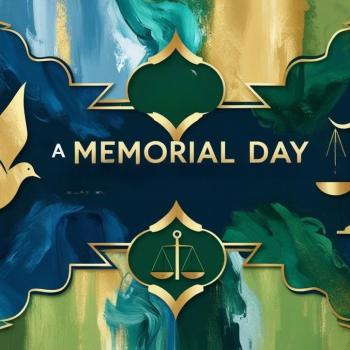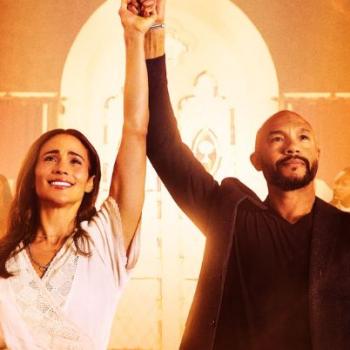Editors' Note: This article is part of the Patheos Public Square on Faith and the Election. Read other perspectives here.
For better or worse, American presidential elections go beyond decisions about effective policy, to which a pure liberal political model might limit itself. Instead, many of the issues shape — and sometimes, even define — the moral and ethical values of this country. If my opinions on these matters come from religious texts and tradition, does that make them any less valid? In the words of Yale law professor Stephen L. Carter, we have every right to "ask why the will of any of the brilliant philosophers of the liberal tradition or, for that matter, the will of the Supreme Court... is more relevant to [public] moral decisions than the will of God. So far, liberal theory has not presented an adequate answer."
The question of religion's appropriate role in elections actually breaks down into three sub-questions. Firstly, what role should religion play in one's personal electoral decisions? Secondly, to what extent should religious criteria be discussed and promoted within a faith group? And then, perhaps the trickiest question, to what extent should these criteria be discussed with, and promoted to, the general electorate?
As for the first question, the Talmud (Makkot 24a) writes that if there is one principle that is at the bottom of all of the Torah's commandments, it is Habakkuk's charge (2:4), "A righteous man will live by his faith." If faith does not inform every issue, it will necessarily inform those issues we hold most dear. Across traditions and within them, serious individuals will not compromise on issues that define who they are as human beings in front of God. It is actually for this very reason that John Locke famously wanted to keep religion out of the affairs of state; it prevents the compromises needed to be able to live in harmony with others with whom we disagree. But Locke notwithstanding, it is an impossibility.
Frankly, I don't understand Christianity's notion of leaving to Caesar what is Caesar's. It could be that it was historically correct in the context of regimes too evil to redeem from the inside and too powerful to overturn from the outside. But such is thankfully not the case today. On the contrary, the very legitimacy of most contemporary governments rests upon the participation of all of its citizens. Once that is the case, the person of faith has an invitation — and hence, a duty — to impact on society as he or she best sees fit, so long as it is within the limits of the law.
The second question is really an extension of the first. In our own religious groupings, we are in conversation with people who hold similar beliefs and commitments. Hence, it is there that our opinions can hold the greatest sway. It is also there that the soundest argumentation can occur: since we share basic assumptions, it becomes a question of clear and lucid analysis of the ramifications of our mutually held values and how they play out in specific circumstances. The only complication is that in-group conversations frequently travel beyond their original setting and turn into more general discussions involving the public at large, which then relates to the third question that we will consider below.
If we have summarily dismissed the first two questions, the third question requires more thought. Such reflection, however, has little to do with the wall of separation between church and state in the United States. Separation was established to prevent the association of the state with a specific church organization. Given the problems that had been experienced in England, the idea was that the American government might never endorse a singular denomination as the state's official religious body. This has nothing to do with invoking religious values in the public square, something which Americans have done at all levels since the beginning of the republic.
If there is no violation of the principle of separation of church and state, what is the problem? Famed political theorist John Rawls answered that religious criteria should only be admissible if expressed in non-religious terms. As a follower of Kant, Rawls thought largely in terms of universal principles. Applied here, these principles meant that the public square only works if all its participants communicate in a language of values and ideas acceptable to all.
Largely in response, however, Michael J. Perry pointed out that to ask a religious individual to leave their religious convictions outside of the polling station is to bracket them; it is to ask them to deny who they are. Since it is burden not shared by the non-religious citizen, it would violate basic principles of fairness. Perry wasn't the only one to find Rawls' criteria unfair; a host of political thinkers and philosophers questioned the soundness of his approach.




